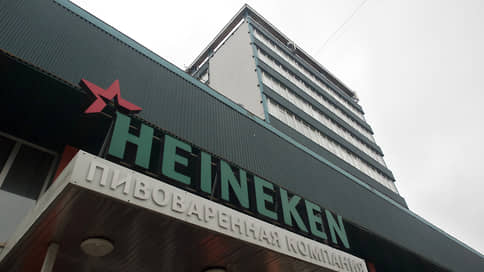The Russian business of Heineken went to the manufacturer of Dichlorvos
[ad_1]

The Dutch brewing holding Heineken, which had been looking for a buyer for its Russian assets for about a year, sold them to Arnest Group, a manufacturer of household chemicals, for €1. The buyer received the company’s debt obligations for €100 million, but not the rights to use the Heineken and Amstel brands. In calmer times, Heineken could have earned at least €300 million for its Russian business, but in the current conditions, the companies are still lucky, unlike Carlsberg and Danone, whose assets were essentially nationalized, lawyers say.
Heineken, which suspended investments in the Russian Federation a year ago due to the military operation in Ukraine, informed On August 25, about the sale of all its factories in Yekaterinburg, Irkutsk, St. Petersburg, Novosibirsk and other cities of the Russian Federation to Arnest Group, created on the basis of the Nevinnomyssk Household Chemicals Plant in the Stavropol Territory. The transaction amount is €1. Buyback of business is not provided. In return, the buyer undertook to repay in installments about €100 million of intra-corporate debt and keep the staff. Nevertheless, the deal will bring Heineken a loss of €300 million, the company said. In the fall of 2022, Arnest bought out the Russian business of Ball Corporation, an American manufacturer of aluminum cans for beer and soft drinks.
In 2022, Heineken in the Russian Federation tripled its net profit year-on-year, to RUB 2.6 billion, and revenue by 13%, to RUB 41.97 billion. In 2022, the company produced 93.65 million decalitres of products, up 0.4% year-on-year. The company’s portfolio includes about 30 brands, including international (Heineken, Amstel, Foster’s, etc.) and local ones (Hunting, Zhigulevskoye, Stepan Razin, Bochkarev). Infoline estimates the company’s market share at 10%, while Baltika (owned by Carlsberg until July 2023) has 27.3%, and AB InBev Efes has 25%.
Arnest Group, which also produces Charm hairspray, Symphony air freshener, and Dichlorvos insect repellant, is owned by the company’s president, Alexei Sagal, according to its statements. According to SPARK, in 2022, the group’s revenue decreased by 21% year-on-year, to RUB 11.71 billion, while net profit decreased by 55%, to RUB 259.3 million.
After the sale of Heineken plants from transnational brewers, AB InBev Efes, controlled by Turkish Anadolu Efes, remains in the Russian Federation. “Foreigners are afraid of the Carlsberg and Danone scenario (in July 2023, by decree of Russian President Vladimir Putin, they were transferred to the management of the Federal Property Management Agency.— “b”) and are in a hurry to sell assets, despite the attempts of the authorities to increase the discount on the property of the outgoing companies, ”explains a Kommersant source on the market. According to him, “outside of an extreme situation”, the market value of Heineken would be at least three times the amount of debt that Arnest has committed to pay.
A Kommersant source from among lawyers does not exclude that Heineken managed to avoid the nationalization of assets, since negotiations on their sale were at the final stage. At the same time, Carlsberg enterprises, he notes, could be of “some strategic value” to the authorities.
Recently, the sale of a business for a symbolic price is a common event for the Russian market. With such a deal, the seller seeks to get rid of additional costs, Dmitry Pozin, a partner at Stonebridge Legal’s corporate practice, notes, adding that assets in the Russian Federation have now become toxic for Heineken and an emergency exit from them was required.
Natalia Abtseshko, head of the Vegas Lex international projects group, considers the buyer’s obligations to repay the intra-group debt to be quite beneficial for Heineken. However, Valery Zinchenko, senior partner at Pen & Paper, adds, “It is not yet known how this condition will be met in Russian realities and whether Heineken will be able, if necessary, to forcibly claim the agreed amount.” Mr. Pozin does not rule out that Heineken in the Russian Federation may have other debts to banks and other counterparties, which will require additional costs from the buyer. In any case, Mr. Zinchenko believes, such a sales model differs from the case with Carlsberg and Danone: “This is both relative transparency and the legal purity of the transaction scheme.”
In turn, Arnest receives only production sites and local brands, but without the use of the best-selling Heineken and Amstel beer brands.
It is difficult to create new brands or develop local ones now, according to the general director of Volkovskaya Brewery, Alexei Aksel, due to high competition in the market and restrictions on beer advertising. Heineken’s only strong Russian brand is Okhota, for the development of other brands it is necessary to significantly reconfigure business processes, adds Nikolai Zhelagin, founder of the Beru Day Off beer store chain. Mikhail Burmistrov, CEO of Infoline-Analytics, does not rule out that Arnest, as a non-core player, will transfer the Heineken business to a professional operator or try to find a strong partner for joint management.
[ad_2]
Source link





